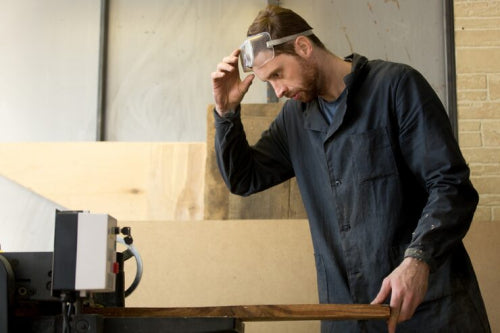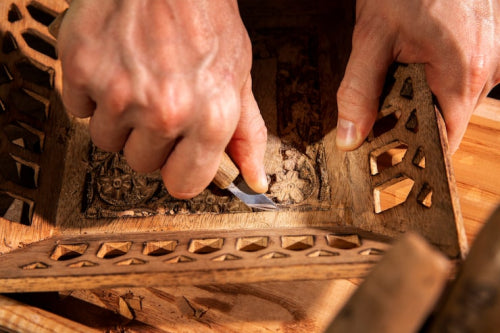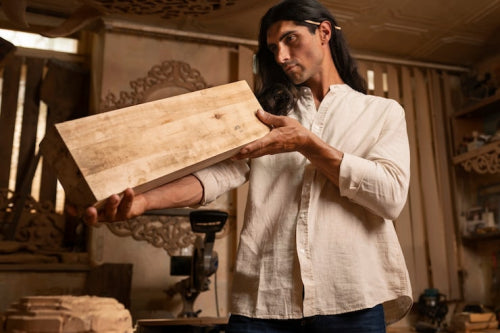Wood endures. In an era of fleeting design fads, this ancient material remains a cornerstone of India's furniture industry, weaving stories of craft, culture, and innovation. From Jaipur's intricately carved workshops to Bangalore's tech-infused studios, India's design hubs are redefining wood's role in modern living. This is not just about furniture it's about a material that adapts, blending heritage with sustainability and cutting-edge technology to meet the demands of today's discerning consumers.
Mass-market furniture lacks heart, filling rooms with bland, short-lived pieces. Frequent breakdowns spark frustration, as replacements erode style and sentiment. At MMC Wood Creations, Udaipur artisans shape heirloom furniture with enduring craftsmanship and cozy elegance, creating pieces that echo your identity, ensuring your home radiates warmth and timeless connection. Shop Now!
Wood's Timeless Adaptability: India's Craft Evolution
In India, wood is a living legacy. Its versatility shines in Bangalore, where artisans pair traditional joinery with CNC machines to craft Sheesham tables tailored for urban homes. In Jaipur, workshops steeped in Rajasthani tradition reimagine colonial motifs for global markets, while Mumbai's designers champion reclaimed teak to meet the rising call for eco-conscious luxury. This adaptability, rooted in India's diverse craft ecosystems, ensures wood remains central to premium furniture design, harmonizing heritage with modern innovation.
The data underscores this momentum. The wood-based panel market, valued at USD 228.4 billion in 2025, is projected to reach USD 288.7 billion by 2030, growing at a 4.8% CAGR, driven by demand for engineered wood in furniture and modular interiors. Meanwhile, India's sustainable furniture sector, particularly in Mumbai and Pune, is expanding at an 18% CAGR through 2029, fueled by consumers prioritizing transparent sourcing and low-carbon production, according to Invest India. Rajasthan's Handicrafts Policy 2022 has empowered Jaipur's artisan clusters, training craftsmen for export markets, with platforms like ONDC and IndiaMart connecting them to global buyers seeking authentic Indian designs.
Regional Craft: Tradition Meets Innovation
Bangalore and Pune are at the forefront of tech-driven woodworking. Small studios leverage CNC machining and 3D visualization to produce furniture that marries precision with soul. Picture a teak dining table, its grain patterns customized through an AR app, letting clients refine finishes before production. These advancements, thriving in Bangalore's maker ecosystem, enhance rather than replace traditional techniques, ensuring each piece is both functional and timeless.
In Jaipur and Kolkata, heritage is the design language. Jaipur's artisans, bolstered by state initiatives, revive Rajasthani woodcraft intricate jali patterns now adorn modern bookshelves. Kolkata's workshops fuse Bengal rosewood's rich hues with Scandinavian minimalism, crafting pieces that resonate in urban apartments and international showrooms. These cities don't merely preserve tradition; they reinterpret it for contemporary tastes.
Sustainability drives innovation in Mumbai, Chennai, and Hyderabad. Designers source reclaimed teak and acacia, aligning with Maharashtra and Tamil Nadu's circular economy goals for 2023–24. Hyderabad's market increasingly favors FSC-certified teak and mango wood, while Chennai's eco-design community adopts low-VOC finishes and water-based lacquers. This shift reflects a broader trend: consumers demand furniture that's as environmentally responsible as it is aesthetically pleasing.
Craft Meets Modern Design
India's furniture makers are experimenting boldly. In Pune and Bangalore, studios combine wood with metal, resin, or glass, creating industrial-modern pieces that appeal to urban buyers. Ahmedabad's CEPT University design incubator fosters collaborations between designers and carpenters, yielding sustainable prototypes that balance form and function. These hybrid designs address the practical constraints of modern living spaces while pushing aesthetic boundaries.
Digital tools are transforming the consumer experience. In Mumbai and Hyderabad, online configurators allow buyers to personalize grain patterns, polish, and dimensions. Pune's high-end cabinetry studios use 3D scanning for ergonomic precision, making bespoke furniture more accessible and scalable. These innovations democratize custom design, turning unique pieces into viable solutions for urban homes.
Wood's influence extends beyond residences. Jaipur's artisan guilds craft bespoke wooden installations for boutique hotels and wellness resorts across Rajasthan and Gujarat, where carved panels evoke a sense of place. In Bangalore's Whitefield tech corridor, corporate interiors embrace modular wooden systems that align with biophilic design, creating workspaces that feel vibrant and human-centric.
Challenges Facing the Industry
Despite its promise, the industry grapples with obstacles. Raw material shortages loom large, with local teak and oak stocks dwindling, forcing reliance on imports. Timber inflation in South India rose 12% year-on-year in 2024, escalating costs. Skilled labor shortages further complicate matters, as artisans from Kolkata and Jaipur migrate to urban centers like Mumbai and Bangalore, leaving regional workshops understaffed. Additionally, inconsistent adherence to FSC or IGBC guidelines creates trust gaps in the sustainable furniture market.
These challenges demand proactive solutions. Scaling plantation-grown timber, standardizing certifications, and investing in artisan training are critical to stabilizing the industry while meeting consumer expectations for quality and sustainability.
Opportunities for Expansion
The future is promising. Incubation centers like IKEA's design lab in Bangalore and the Craft Council of India in Chennai nurture innovation, supporting startups that blend handcrafted woodwork with AI-assisted design. E-commerce platforms like ONDC and IndiaMart are opening global markets, enabling Jaipur and Ahmedabad workshops to tap demand from GCC and Southeast Asian buyers. This digital expansion, paired with India's craft heritage, positions the country as a leader in premium wooden furniture.
Consumer demand for eco-conscious design is a key driver. Mumbai and Pune's sustainable furniture market thrives, propelled by buyers who value traceable sourcing and low-impact production. Globally, the wood products market is projected to reach USD 1,159.94 billion by 2029, growing at a 6.9% CAGR, with sustainability and renewable sourcing as key growth factors. Brands that share compelling stories about the forest where their teak was sourced or the artisan who shaped their table will resonate deeply with consumers.
A Timeless Craft, Reimagined
Wood's story in India is one of reinvention. From Jaipur's heritage workshops to Bangalore's tech-driven studios, this material is being reshaped to meet modern demands while retaining its essence. As a CEPT Ahmedabad design researcher notes, “The evolution of woodcraft lies in its conversation with context how it absorbs culture, technology, and sustainability.”
Looking forward, India's furniture makers are set to lead globally, blending digital innovation with artisanal expertise. Hybrid designs pairing wood with novel materials, transparent sourcing that builds trust, and partnerships amplifying local talent will drive the industry. In a world of transient trends, wood remains a constant adaptable, enduring, and unmistakably Indian.
Frequently Asked Questions
Why is wood still popular in India's furniture industry despite modern material alternatives?
Wood remains central to India's furniture industry due to its timeless adaptability and ability to blend heritage craftsmanship with modern innovation. Indian artisans across cities like Bangalore, Jaipur, and Mumbai are combining traditional woodworking techniques with cutting-edge technology like CNC machining and 3D visualization. The wood-based panel market is projected to reach USD 288.7 billion by 2030, driven by demand for both engineered wood and sustainable, eco-conscious designs that resonate with contemporary consumers.
How is sustainable wood furniture growing in India's major cities?
India's sustainable furniture sector, particularly in Mumbai and Pune, is experiencing rapid growth at an 18% CAGR through 2029, fueled by consumer demand for transparent sourcing and low-carbon production. Cities like Chennai, Hyderabad, and Mumbai are leading the eco-design movement by sourcing FSC-certified teak, reclaimed wood, and using low-VOC finishes. This shift aligns with state-level circular economy goals and reflects a broader consumer trend prioritizing environmentally responsible furniture that doesn't compromise on aesthetic appeal.
What challenges does India's wooden furniture industry face in 2025?
The industry faces three primary challenges: raw material shortages with dwindling local teak and oak stocks forcing reliance on imports, skilled labor migration from traditional craft centers like Jaipur and Kolkata to urban hubs, and timber inflation that rose 12% year-on-year in South India during 2024. Additionally, inconsistent adherence to FSC and IGBC certification standards creates trust gaps in the sustainable furniture market, requiring proactive solutions like scaling plantation-grown timber and investing in artisan training programs.
Disclaimer: The above helpful resources content contains personal opinions and experiences. The information provided is for general knowledge and does not constitute professional advice.
You may also be interested in: The Influence of Scandinavian Design on Indian Woodwork
Mass-market furniture lacks heart, filling rooms with bland, short-lived pieces. Frequent breakdowns spark frustration, as replacements erode style and sentiment. At MMC Wood Creations, Udaipur artisans shape heirloom furniture with enduring craftsmanship and cozy elegance, creating pieces that echo your identity, ensuring your home radiates warmth and timeless connection. Shop Now!
Powered by flareAI.co




